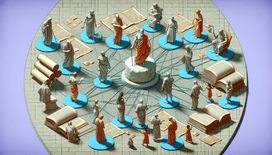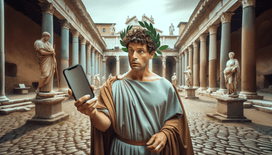Ah, the Ides of March! Famously marked by soothsayers as a day of doom for our toga-clad friend, Julius Caesar. Now, picture this: Julius, armed not just with his loyal legions, but an arsenal of 21st-century linguistic prowess, Google Translate in hand (figuratively speaking, because no rucksack should bear the weight of all those cables and chargers!).
The Prelude: A Latin Love Affair
Long before crossing the Rubicon became the ultimate 'point of no return' moment, Julius Caesar had already written himself into the annals of history using his unequalled eloquence, "Veni, Vidi, Vici" and all that jazz. But what if, in a twist of fate, he’d had modern technology to break not just geographical barriers, but linguistic ones too?
With Google Translate at his disposal, the number of languages for Caesar to charm and conquer would skyrocket. Imagine his letters to Cleopatra being penned perfectly in Egyptian hieroglyphics rather than Latin, I suppose even Cleopatra wouldn't be using Rosetta Stone in this version of events. "I came, I saw, I translated," would certainly have added a dash of mystery to his Résumé.
Communications Across the Empire
As Caesar stood on the banks of the Rubicon River, a choice weighed heavily on his shoulders: to cross or not to cross? With Roman legions as his notification squad, it was a matter of political Pandora’s box. But, with Google Translate, he could simply tap his finger and convert those Latin proclamations into the multitude of dialects peppering his dominion.
Caesar, heralded for his military genius, might have crafted real-time, multilingual commands rather than relying on an elaborate game of "Latin whisper-down-the-lane" when conveying orders to distant provinces. Google Translate would function for him like a Rosetta phone, except with potentially more hilarious what-on-earth-is-this-translation errors to navigate (it is a known fact that "peeves" translate interestingly across empires!).
The Political Game
They say a picture is worth a thousand words, but, oh, how words levied the fate of speared soldiers and kilted horsemen. Perhaps Google Translate would have been Caesar’s ace card to bridge this divide. Let's hypothesise some scenarios shall we?
- Scenario One: Negotiation or Confusion? Picture Caesar in a tent, with Marc Antony at his side, using Google Translate to interpret Gallic tribal discussions. A slightly bemused Gallic chieftain would ask, "Why are your weapons so shiny? And your words so... automated?"
- Scenario Two: Diplomatic Excellency What if Caesar sent diplomatic emails (possibly in Comic Sans) to ensure his actions were massacred by PR errors rather than client-centered bonhomie. Imagine the diplomatic awe he could instil, his fingers dancing across the screen like an alchemic scribe.
The Humorous Limbo of Latin Technology
Yet, with all practicality aside, one humours to imagine the everyday hurdles of Caesar dealing with technology. It would be worth noting how he’d handle those automated notifications: "I see you’re trying to take over a province, would you like some help with that?" As Roman generals facepalm, Caesar swipes a befuddling error message: "Alea iacta est; Your translation request has timed out." Such phrases would delight even the stern-faced marble statues.
The Unseen Consequences
There is no denying the whimsy of weaving intricate what-ifs into the tapestry of history. However, would the course of Rome’s illustrious past unravel in the clutches of Google-powered prose? Perhaps the Republic transforms into a conglomerate of language departments, where victorious verbs substitute victorious virile strength, and translations, rather than treaties, become the currency of choice. Sophocles might even pen a tragicomedy titled, "Oedipus Translated."
Conclusion: Not Lost in Translation
As history buffs and tech lovers, we revel in how technology and history collide, only to excel us back to curiosity. Experiencing ancient Rome through Julius Caesar’s roving eye and Google’s techno-translation lens provides a glimpse, of whether this ancient tale would read differently when a modern app plays scribe in the annals of yesteryears.
So, would Caesar have crossed the Rubicon? With Google Translate in hand, perhaps he’d already be rallying Egyptian allies, texting colleagues in Athens, or worse, sending live Roman snaps: "Crossed Rubicon. Soz not soz, Pompey!" He might not have shied away but, assured by technicolour translations, he’d probably have WhatsApped the rest of us: Ad astra per aspera, through the rough times to the stars, indeed.







